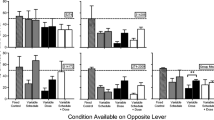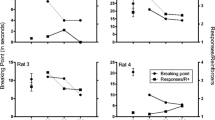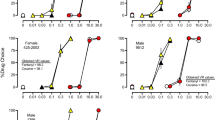Abstract
Previous research has shown that concurrent schedule responding maintained by cocaine under short variable-interval (VI) schedules is well described by the generalized matching law. That is, drug-maintained behavior was apportioned in accordance with relative frequency of reinforcement. The purpose of the present experiment was to examine the ability of the generalized matching law to account for choice under longer VI schedules of cocaine availability, and to compare cocaine-maintained to food-maintained behavior in this regard. One group of rhesus monkeys (n=4) was prepared with indwelling IV catheters and allowed to respond under concurrent VI (conc VI) schedules of cocaine delivery (0.025, 0.05 or 0.1 mg/kg per injection) with an average inter-reinforcer interval (IRI) of 10 or 30 min. In a second group of monkeys (n=4), a comparable experiment was conducted but with responding maintained by different amounts of food (one, two, or four 1-g banana-flavored pellets). For both groups, the same reinforcer followed responding on either lever, the only difference between the options being the VI schedule, i.e., frequency of reinforcement. The behavior of the cocaine-maintained group was well predicted by the generalized matching law. While both groups evidenced undermatching of both response and time allocation, lever pressing of monkeys whose behavior was maintained by food showed more undermatching than that of the cocaine-maintained group. In addition, a consistent and unexplained bias in responding toward the right lever developed in the food-maintained, but not the cocaine-maintained monkeys. Considering the present results with those of previous experiments, it appears that food-, but not cocaine-maintained behavior, deviates increasingly from strict matching as the IRI is extended. This difference across reinforcers could be due to differences between cocaine and food in the mechanisms by which they maintain behavior, or a direct effect of cocaine on choice performance.
Similar content being viewed by others
Author information
Authors and Affiliations
Additional information
Received: 9 February 1998 / Final version: 4 June 1998
Rights and permissions
About this article
Cite this article
Woolverton, W., Alling, K. Choice under concurrent VI schedules: comparison of behavior maintained by cocaine or food. Psychopharmacology 141, 47–56 (1999). https://doi.org/10.1007/s002130050805
Issue Date:
DOI: https://doi.org/10.1007/s002130050805




